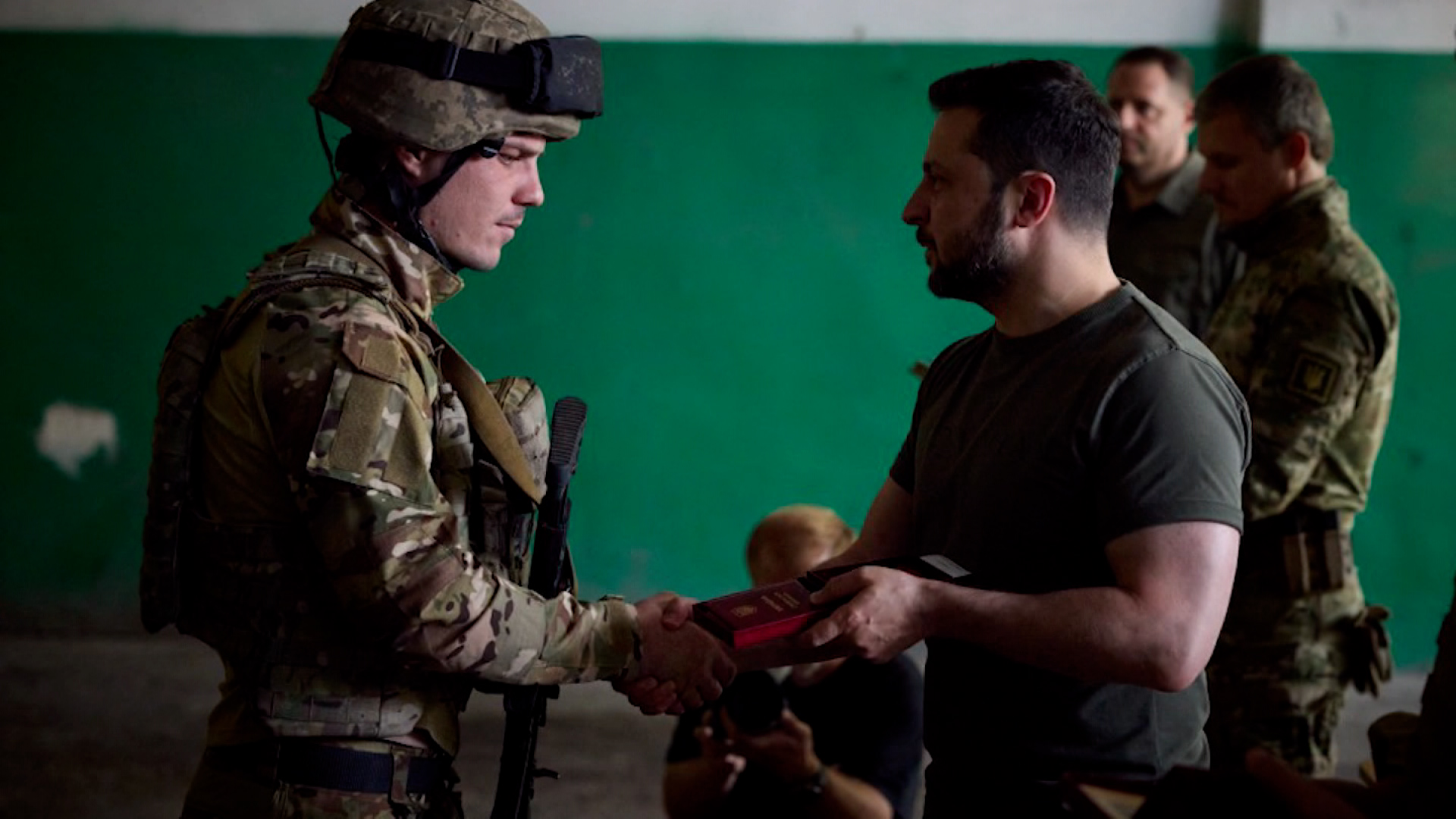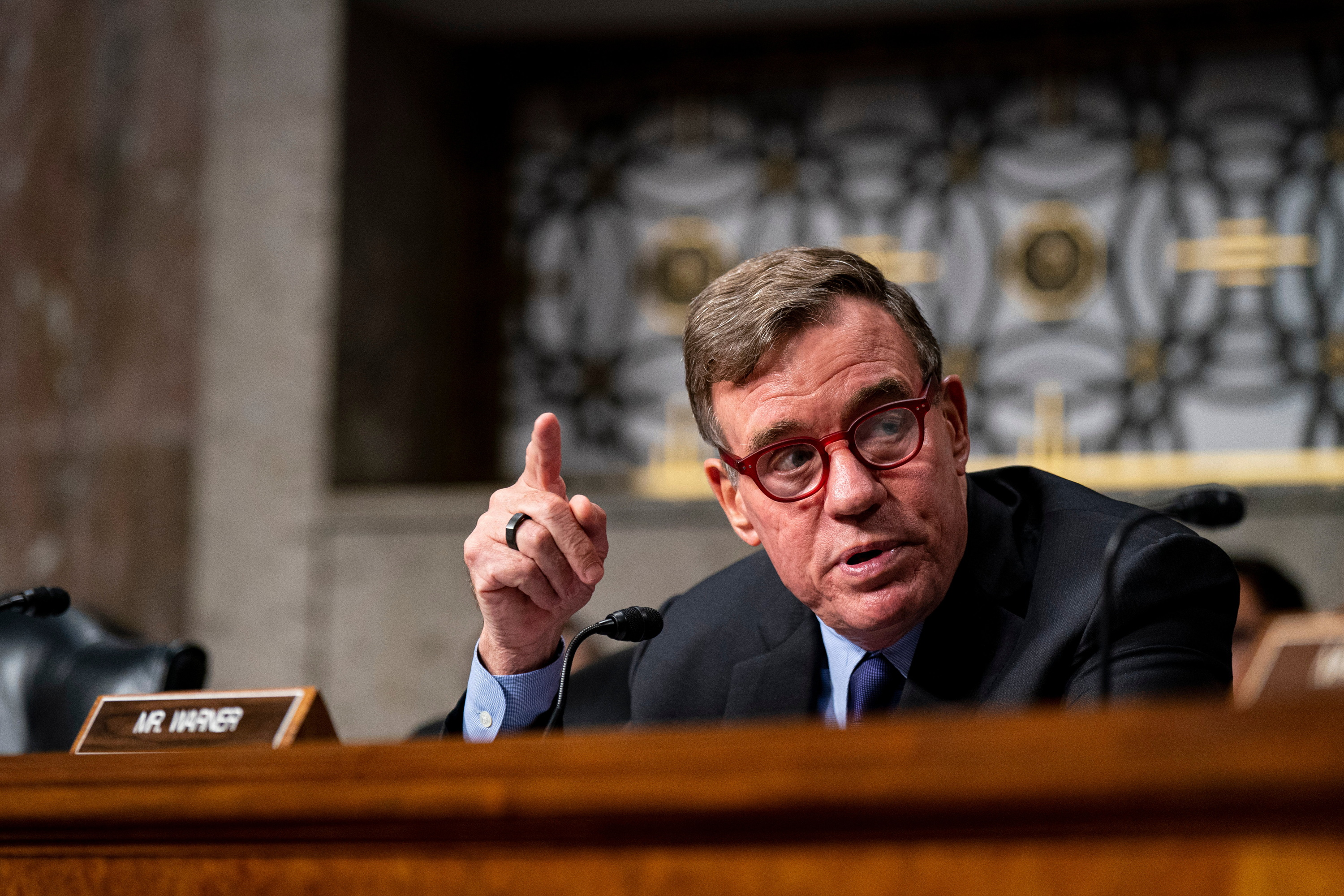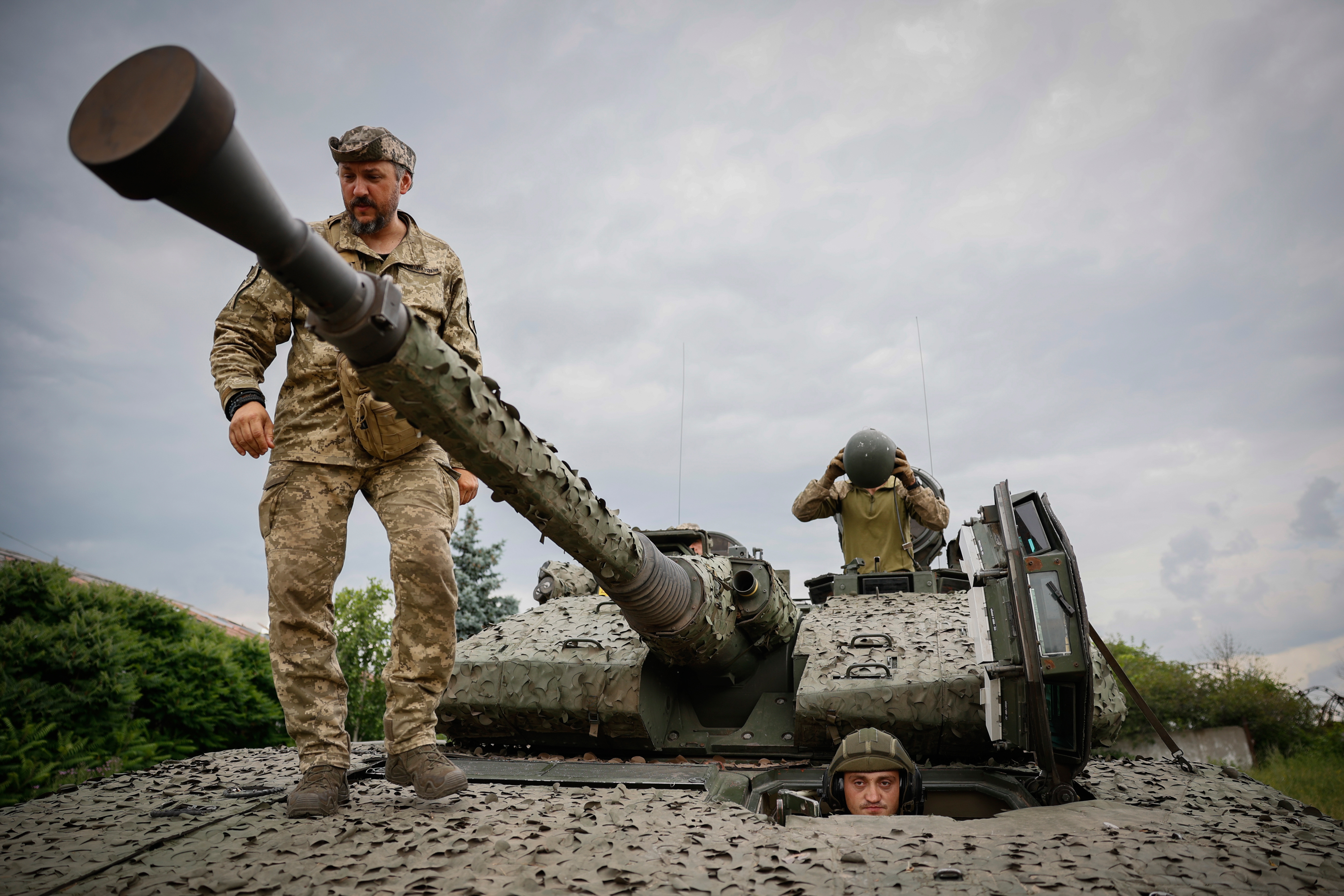Our live coverage of the fallout after Wagner's rebellion and Russia's war in Ukraine has moved here.
June 26, 2023 - Russia-Ukraine, Wagner rebellion news
By Kathleen Magramo, Christian Edwards, Aditi Sangal, Mike Hayes, Maureen Chowdhury and Amir Vera, CNN
China's foreign minister touts Beijing and Moscow as a force for "global peace"
From CNN's Hira Humayun
Russia and China are "an important force in ensuring global peace and in promoting inclusive development," Chinese Foreign Minister Qin Gang claimed in a video address Tuesday, according to Russian state news agency TASS.
Speaking at a conference in Beijing held by the Russian International Affairs Council and the Chinese Academy of Social Sciences, Qin reiterated Beijing's support for Moscow, saying it plans to work with Russia to oppose the "use of force and hegemony of individual states," TASS said.
Qin's remarks come after senior Chinese officials expressed support for Moscow during a meeting with Russia's Deputy Foreign Minister Andrey Rudenko in Beijing on Sunday following the Wagner rebellion, according to a Russian Foreign Ministry statement.
On Sunday, a Chinese Foreign Ministry spokesperson referred to the uprising as Russia's "internal affair" and added: "As Russia’s friendly neighbor and comprehensive strategic partner of coordination for the new era, China supports Russia in maintaining national stability and achieving development and prosperity."
Some context: China and Russia declared a friendship with “no limits” in February 2022, shortly before Russian President Vladimir Putin launched his war on Ukraine. Since then, Beijing has refused to condemn the invasion and instead provided much-needed diplomatic and economic support for Russia while attempting to portray itself as a peacemaker in the conflict — a position that has further soured its relations with Western nations.
Putin addresses insurrection and Prigozhin's whereabouts are unknown. Here's what you need to know
From CNN staff
In the aftermath of Saturday's insurrection by the Wagner Group, Russian President Vladimir Putin said Monday that the "armed rebellion would have been suppressed anyway."
Putin's last address to the nation was on Saturday as Wagner chief Yevgeny Prigozhin and his forces launched their march toward Moscow.
Putin thanked the Wagner fighters who made the "right decision" and halted their advance. He said those fighters would have the "opportunity to continue serving Russia by entering into a contract with the Ministry of Defense or other law enforcement agencies or to return to your family and friends. Whoever wants to can go to Belarus."
He did not mention Prigozhin by name, but he accused “the organizers of the rebellion” of “betraying their country, their people, (and) also betrayed those who were drawn into the crime.”
The Wagner march was called off when a supposed deal was struck that would see Prigozhin move to Belarus. Prigozhin remains under investigation following the rebellion, according to a source at Russia’s Prosecutor General’s Office.
Here are the latest headlines on the rebellion and Russia's war in Ukraine:
- Putin meets with top officials after insurrection: Putin held a meeting with the heads of security agencies, including Defense Minister Sergei Shoigu, Kremlin spokesperson Dmitry Peskov said on Monday night, according to state media RIA Novosti. Prigozhin had previously accused Shoigu and Russia’s top general, Valery Gerasimov, of not giving his forces ammunition and was critical of their handling of the conflict in Ukraine. Putin also spoke with UAE President Mohamed bin Zayed Al Nahyan about the rebellion, according to the Kremlin.
- Wagner chief explains his reasoning: Earlier on Monday, Prigozhin broke his silence in an audio message, saying he called off the march to prevent Russian bloodshed and that the rising was a protest rather than an attempt to topple the government. The Wagner boss said the Russian Defense Ministry had planned for the Wagner private military group to "cease to exist" starting on July 1.
- US response to "armed rebellion": As Russia faced a shocking rebellion, White House officials reached out to foreign and domestic oil producers about the situation unfolding in one of the world’s leading oil powers, a US official told CNN. On Monday, US President Joe Biden said he'd instructed members of his national security team to "prepare for a range of scenarios" as the rebellion was underway. Biden emphasized the US and its allies had "nothing to do" with Saturday's events in Russia.
- Lukashenko to answer questions: Belarusian state media said President Alexander Lukashenko will answer questions from journalists on Tuesday, according to Russian state media RIA Novosti. Prigozhin had agreed Saturday to leave Russia for Belarus, the Kremlin said, in a deal apparently brokered by Lukashenko, a close Putin ally. The Wagner chief's whereabouts remain unknown.
- US intel was aware: US intelligence officials were able to gather an extremely detailed and accurate picture of Prigozhin's plans leading up to his short-lived rebellion, including where and how Wagner was planning to advance, sources familiar with the matter told CNN. But the intelligence was so closely held that it was shared only with select allies, including senior British officials, and not at the broader NATO level, sources said.
- Russia's lower parliament says defense forces had total control: The Russian State Duma, or lower parliament, said the defense forces exercised total control during Wagner's armed rebellion, according to Russian state media TASS. Andrey Kartapolov, the Duma's head of the Defense Committee, said that “no chaos arose in the Russian defense forces in the background of an attempted armed rebellion, combat control was not interrupted even for a minute."
- Zelensky claims Ukraine forces have made advances: President Volodymyr Zelensky said Ukrainian forces have made advances on all fronts. The remarks followed his visit to the frontlines of the Donetsk region and Zaporizhzhia on Monday. The Ukraine military said separately that Russia was focusing its efforts on cities in the eastern Donetsk region.
Ukrainian fighters have advanced in all directions of frontline, Zelensky says
From CNN's Mariya Knight

Ukrainian President Volodymyr Zelensky said Monday that Ukrainian forces have made advances on all fronts.
“Our warriors have advanced in all directions, and this is a happy day,” Zelensky said in his nightly address.
CNN cannot verify the Ukrainian accounts of advances on the battlefields.
Zelensky's comments followed his visit to the frontlines of the Donetsk region and Zaporizhzhia on Monday. Zelensky said he awarded Gold Stars of the Hero of Ukraine to two fighters and met with several generals.
The Ukrainian president added that “several operational decisions were made” during his meeting with the generals.
During Wagner rebellion, allies reached out to Ukraine advising not to strike inside Russia
From CNN's Natasha Bertrand, Alex Marquardt, Kylie Atwood and Kevin Liptak
Before Wagner chief Yevgeny Prigozhin stood down on Saturday, there was outreach to Ukrainian officials from allies on a number of different levels, cautioning them to resist taking advantage of the chaos to strike inside Russia, according to a Western official.
The concern was that Ukraine and the West would be seen as helping Prigozhin and threatening Russian sovereignty.
"The message was don't rock the boat here," the official said, adding that the message was transmitted at the foreign minister level, deputies and through ambassadors.
"It's an internal Russian matter," the official said the Ukrainian officials were told, echoing what US and other Western officials have said publicly.
"Ukrainians were being cautioned by allies not to provoke the situation. Make hay of opportunities on Ukrainian territory but don't get drawn into internal matters or strike at offensive military assets inside of Russia," the official said.
In the war with Russia, Ukraine is suspected of carrying out a growing number of covert cross-border attacks and sabotage on Russian military facilities and even a drone strike on the Kremlin. Ukrainian forces have shelled the Russian Belgorod region, near the border between the countries.
"You just don't want to feed into the narrative that this was initiative by us," the official said. "It's what the Russians always wanted, proving that there are threats to Russian sovereignty."
Wagner uprising "was almost hiding in plain sight," US Sen. Mark Warner says
From CNN's Natasha Bertrand, Alex Marquardt, Kylie Atwood and Kevin Liptak

Wagner chief Yevgeny Prigozhin's uprising did not come out of nowhere. US officials had been tracking his ongoing growing feud with Russia's Ministry of Defense for months and took note when threats were traded back and forth between them. There were also signs that Wagner was stockpiling weapons and ammunition leading up to the rebellion, CNN has reported.
Democratic Sen. Mark Warner, the chairman of the Senate Intelligence Committee and a member of the Gang of Eight, told CNN that Prigozhin's rebellion "was almost hiding in plain sight."
Still, it was surprising to US intelligence officials how little resistance Wagner faced.
"Putin of 10 years ago would have never allowed this to play out the way it did," Warner said, adding that Putin is "clearly weakened."
"The fact that you have a mercenary group, that I don't think had a full 25,000 troops the way Prigozhin claimed, but was able to literally march into Rostov, a city of a million people which was the command and control for the whole Ukrainian war and take it over with barely a shot fired — that is unprecedented, to say the least," Warner said.
Multiple sources told CNN that US and Western officials believe that Putin was simply caught off guard by Prigozhin's actions and did not have time to array his forces against the mercenaries before they managed to seize control of the military headquarters in Rostov. Putin also likely did not want to divert significant resources away from Ukraine, officials said.
Officials do believe, however, that had Prigozhin tried to seize Moscow or the Kremlin, he would have lost — decisively. That is likely why Prigozhin agreed to strike a deal with Belarus and ultimately turned his troops around, the officials said.
Once Prigozhin launched his rebellion, senior US officials began scrambling to connect with allies and partners and reiterate a key message: The West should remain silent and not give Putin any opening to lay the blame on the US or NATO for the insurrection.
Privately, US officials were reinforcing to the Russian government that the US had nothing to do with the uprising — and urging them to maintain the safety and security of their nuclear arsenal, officials said.
US gathered detailed intelligence on Wagner chief's rebellion plans but kept it secret, sources say
From CNN's Natasha Bertrand, Alex Marquardt, Kylie Atwood and Kevin Liptak
US intelligence officials were able to gather an extremely detailed and accurate picture of Wagner chief Yevgeny Prigozhin's plans leading up to his short-lived rebellion, including where and how Wagner was planning to advance, sources familiar with the matter told CNN.
But the intelligence was so closely held that it was shared only with select allies, including senior British officials, and not at the broader NATO level, sources familiar with the matter told CNN.
It was not clear exactly when Prigozhin would act, the sources said. But he appears to have decided to move forward with his plan following a June 10 declaration by Russia's Ministry of Defense that all private military companies, including Wagner, would be forced to sign contracts with Russia's military beginning in July and essentially be absorbed by the Russian Ministry of Defense.
The intelligence was so secret that within the US, it was briefed only to the most senior administration officials as well as the Gang of Eight members of Congress who have access to the most sensitive intelligence matters.
The secrecy surrounding the intelligence was why some senior European officials and even senior officials across the US government were caught off guard by Prigozhin's attack on Friday, and the speed with which Wagner forces marched into Rostov-on-Don and up toward Moscow into Saturday morning, the sources said.
Some NATO officials expressed frustration that the intelligence was not shared. But doing so would have risked compromising extremely sensitive sources and methods, sources explained. Ukrainian officials were not told about the intelligence in advance, either, officials said, due primarily to fears that conversations between US and Ukrainian officials might be intercepted by adversaries.
Biden spent the days after the rebellion fizzled out speaking with allies, including the leaders of France, Germany, the United Kingdom and Canada, as well as Ukrainian President Volodomyr Zelensky. During those conversations, he shared what information the US had about the rebellion, according to officials, in order to ensure the leaders had a better understanding of what was known to US intelligence.
Analysis: Here's how Ukraine will seek to take advantage following rebellion in Russia
From CNN's Nick Paton Walsh

Seismic shifts in Moscow must surely spell similar earthquakes along the front lines in Ukraine. But as of Monday, that’s yet to happen.
Ukraine’s forces have announced slight changes along the southern front during the weekend and more sustained progress around the largely symbolic city of Bakhmut —where thousands of Wagner fighters likely died over the winter.
On Monday morning, Deputy Defense Minister Hanna Mailar said Ukrainian troops had retaken Rivnopil in Donetsk region, which might suggest greater progress in the south. But there has been no Russian collapse, despite that appearing as a major possibility in Moscow during a large part of Saturday, as mutinous Wagner forces threatened to march on the Russian capital.
Disruption to Russia’s presence around Bakhmut is a more likely outcome from the weekend’s turmoil, where some Wagner fighters may retain a presence but where Ukraine has already been advancing.
There will undoubtedly have been some changes to Russia’s military positioning as a result of Wagner’s failed insurrection.
The group appears to have prepared their rebellion for some time and the units used will hence not have been suddenly withdrawn from the trenches last week. But the Russian military may have panicked at seeing mercenaries advance on Moscow and sent help.
A key moment for Moscow's adversaries: This all provides opportunities that Russia’s enemies must seize carefully.
Ukraine and its NATO allies will urgently be trying to assess what and where they are, and whether they provide a material advantage to their counteroffensive. But this is not something you would seek to rush or get wrong.
The sudden application of a bulk of Ukraine’s forces to exploit Russian weaknesses is something Kyiv will doubtless have been patiently waiting for and weighing the merits of for weeks.
The weekend’s events have left an indelible mark on the Kremlin’s chances of success in the war. And there are three different ways this can assist Ukraine.
Putin speaks to Emirati counterpart about Wagner rebellion, the Kremlin says
From CNN's Mariya Knight and Sofia Cox
Russian President Vladimir Putin spoke to UAE President Mohamed bin Zayed Al Nahyan about the June 24 Wagner rebellion, according to the Kremlin on Monday.
The call was at the initiative of the Emirati side, and the president was interested in "hearing assessments of the situation in Russia in connection with the attempted rebellion on June 24," the Kremlin said.
Mohamed bin Zayed declared his "full support for the actions of the Russian leadership," according to the Kremlin.
UAE state news agency WAM tweeted on Monday saying the UAE and Russian presidents discussed bilateral relations over a phone call and "reaffirm the need to preserve the stability of Russia and the safety of its people."
The two leaders also discussed cooperation between their countries following their meeting on June 16 at St. Petersburg International Economic Forum, according to the Kremlin statement.
Some context: At that meeting the two leaders discussed bilateral relations and the situation in Ukraine, according to UAE state news agency WAM on June 16.
"The UAE continues to support all efforts aimed at reaching a political solution through dialogue & diplomacy - towards global peace & stability," The Emirati president Tweeted on June 16 about the meeting.